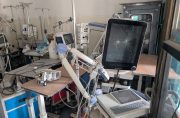Advocacy to End U.S. Torture
Since 2003, when reports of torture by U.S. military personnel began to surface publicly, PHR has waged a high-profile campaign to expose U.S. torture and to end medical complicity in such abuses. Through our investigations and advocacy, we have pursued accountability for psychologists and doctors who aided and abetted torture, and worked with professional organizations to strengthen ethical norms. We have also mobilized thousands of health professionals to ensure the medical community is never again asked or ordered to participate in the intentional infliction of harm.
When U.S. President Trump’s stated his openness to using torture, PHR mobilized than 1,100 health professionals who signed our pledge never to participate in or condone torture or other cruel, inhuman, or degrading treatment. We continue our efforts to make sure that the United States unequivocally rejects torture as official policy, to insist that health professionals are not ordered to participate, and to ensure that detainees are treated humanely and that they receive reparations for the harms they have suffered.
Our advocacy to end U.S. torture is based on almost two decades of investigations into the U.S. government’s authorization and use of abusive interrogation and detention practices.
Challenging Abusive U.S. Immigration Policies
PHR is shining a spotlight on the profound harms inflicted on children and parents by the U.S. administration’s family separation and detention policies. We mobilized more than 20,000 medical professionals to protest the practice. In the face of increasingly stringent asylum policies, many of the more than 1,200 medical professionals in our Asylum Network are helping asylum seekers by providing pro bono forensic medical evaluations to support their asylum applications. These physical and psychological assessments can corroborate asylum seekers’ accounts of torture and ill-treatment in their country of origin and are a critical element in helping them secure safe haven in the United States.
Breaking Torture’s Sway in Central Asia
PHR’s years of training and advocacy in Central Asia has transformed attitudes about torture. Where torture was once the norm for extracting confessions from detainees, governments are now adopting policies and legislation to investigate and document instances of torture and to prosecute those responsible. Our experiences in Central Asia are the foundation for global efforts to encourage governments around the world to reject torture and to create cultures of accountability and respect for human rights.



